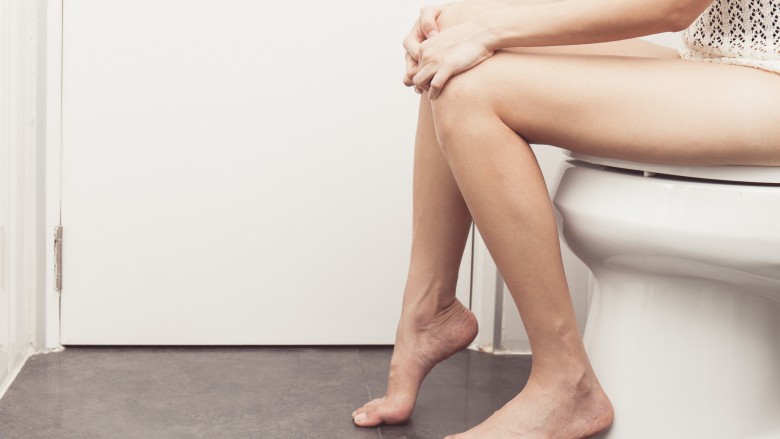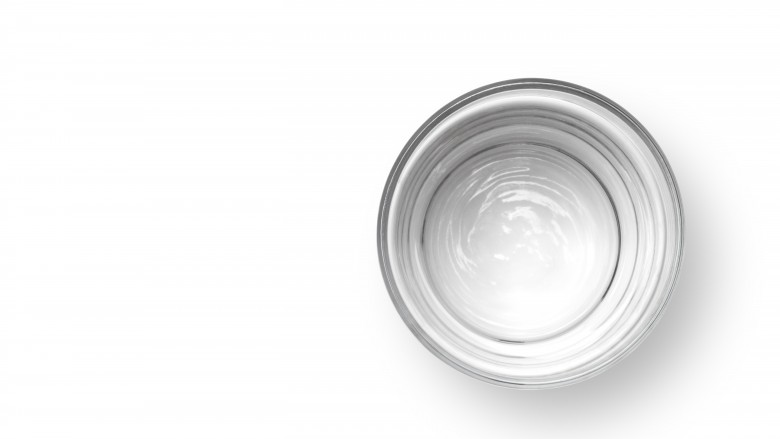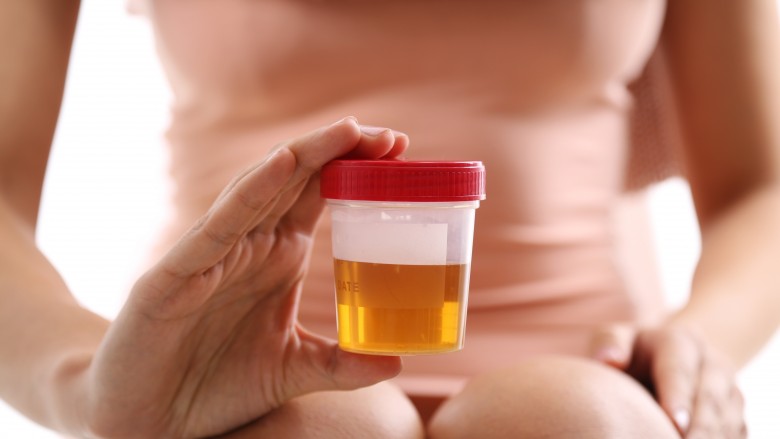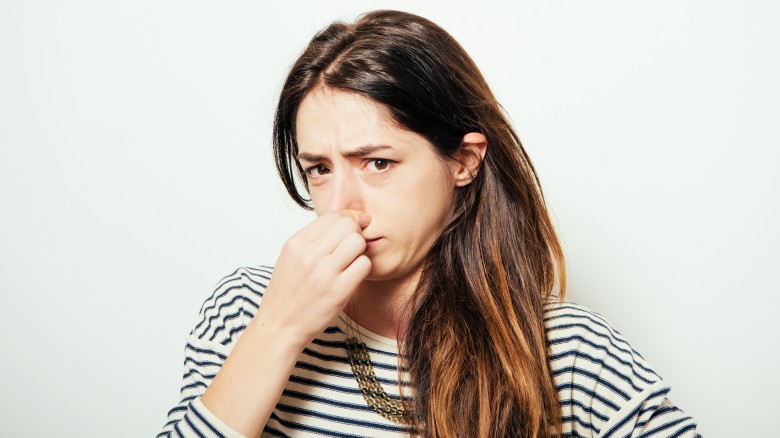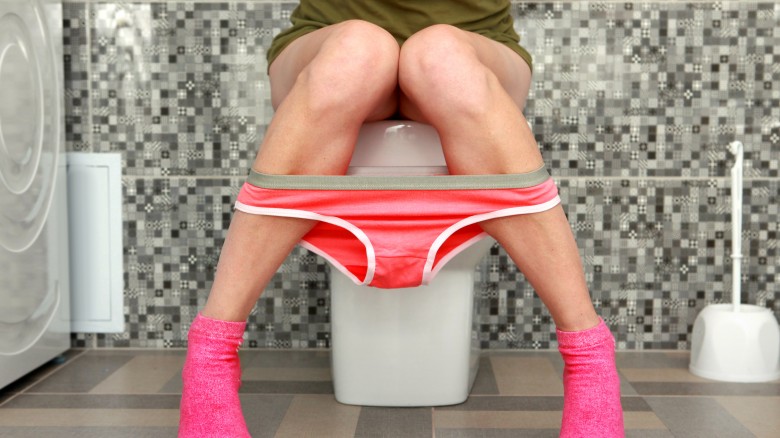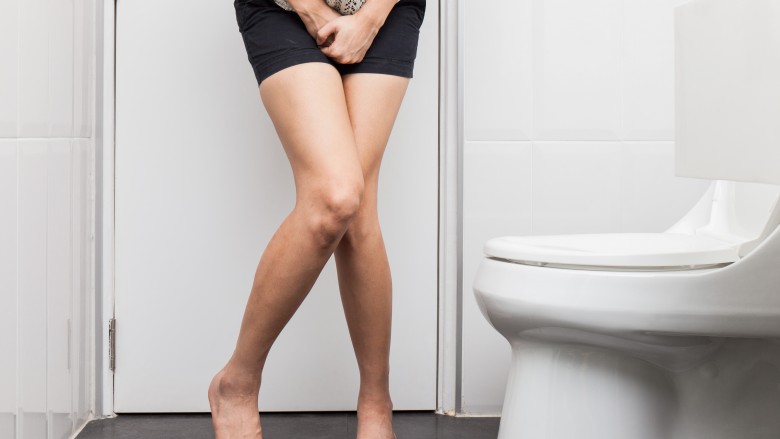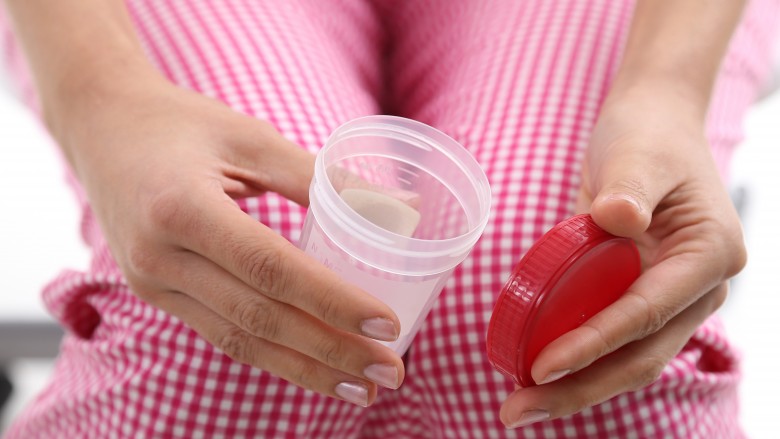What Your Pee Reveals About Your Health
Ask someone if they look into the toilet after they've done their, well, "business," and the question is usually met with some form of a grossed-out look, and an exclamation that sounds something like, "Ew, no. Why would I do that?!" However, did you know that having a quick peek might actually be good for your health?
Aside from being the end result of our kidneys filtering out toxins and waste from our blood, urine can be a helpful (and simple to observe) diagnostic tool to alert you to things going on in your body, from dehydration to mercury poisoning.
Each one of us takes in, through what we eat and what we drink, different amounts of nutrients, different minerals, as well as things like chemicals that may not be too good for us. At the same time, our body creates the appropriate metabolic byproducts it needs to get rid of — enter, kidneys. "The kidneys' main function is to regulate what's going on in the blood stream," said Urologist Dr. Barrett Cowan, of Urology Associates. This byproduct is urine.
What exactly is urine, anyway?
Urine is one of the main ways the body eliminates excess water and salt, as well as other waste removed from the blood by the kidneys. Basically, without urine or your kidneys, Dr. Cowan says, "We could get very sick, the body couldn't function properly, and all kinds of bad things would happen as a result of that." This is why observing the different characteristics of your urine is so important. If you do so, you could catch the early stages of a simple urinary tract infection (UTI) or perhaps, something potentially more harmful, like kidney disease.
There are many different ways your urine can tell you about the state of your health. The first, and arguably the most common, according to Dr. Cowan, is the color of your urine. You can also tell something may be wrong through the odor and sensation you feel when urinating.
Clear or pale urine is usually a good sign
If you're wondering what color is 'normal' for urine, you're not the only one. I spoke with Dr. Adam Ramin, urologist and medical director of Urology Cancer Specialists in Los Angeles, California, who says that this is one of the most commonly asked questions of urologists. He says the answer is that your pee can fall under a wide spectrum of shades that are considered normal. This is usually based on individual patients and their lifestyle, pre-existing conditions, or genetics. For example, he says, "pale or clear urine usually means that you are well hydrated. Taking diuretic supplements are also know to stimulate bladder function, which could cause you to urinate more frequently. This could dilute the color of your urine."
So, if you happen to notice that there is a lack of color in your urine, it likely means that you have nothing to worry about. Keep drinking that water!
Is dark or orange urine normal?
Orange or darker urine shouldn't be an immediate cause for concern. "In some people, eating a large serving of carrots is enough to turn their urine orange for a period of time." says Dr. Ramin. More often than not, though, varying shades of yellow or orange can all signal a healthy bladder. However, if you've got orange pee and you haven't been binge-eating carrots à la Bugs Bunny, you may want to consider that this might be a symptom of dehydration. He says that when you have not been drink enough fluids, the compounds in your pee become more concentrated, and this is what makes it appear darker in color.
According to George Krucik, MD and medical reviewer for healthline.com, if you take any drugs like Rifampin, laxatives or Sulfasalazine, orange urine could simply be a side-effect of those medications. He also says that orange urine "may be a sign of problems with your bile ducts or liver." It may a good idea to consult your physician if you don't take any medications, you are well-hydrated, and your pee's orange or dark color persists.
Red or pink urine should be carefully monitored
Most people know that if blood appears anywhere, it's usually not a good sign. This holds true for blood in your urine, which is generally the cause of red or pink collar, according to Dr. Ramin. He told me that, "From a simple infection to cancer, bloody urine is never normal and needs to be immediately evaluated by a urological expert."
"Blood appearing in urine, turning it red or pink, can be a sign of a kidney disease." says Dr. Cowan. However, before jumping to conclusions, note that eating a large amount of foods such as beets can also change the color of your pee. "I've had people come to me and say, 'Something's wrong. There's blood in my urine. It's red and I need you to test it, please!' and of course I took a sample, tested it, and when the tests didn't reveal anything, I asked my patient, 'Have you been eating a lot of beets by any chance?' and when they say yes, I tell them that that's their answer."
If you're looking for more signs before you head to the doctor, the odour of your urine might be a good place to start.
And what if there's a smell?
Another common question is whether or not urine should smell.
In fact, you should probably be paying attention to the smell of your urine. For most people, according to Dr. Ramin, "urine should be fairly odorless, or should have only a slight ammonia-like smell." However, he says that if you suddenly notice any pungency to your urine, that could be a sign of infection or urinary stones, especially if it is accompanied by a cloudy appearance. That warrants a trip to your doctor for evaluation.
One example of what's causing a sudden unpleasant odour in your urine could be a yeast infection. According to Dr. Sherry Ross, an ob-gyn at Providence St. John's Health Centre in Santa Monica, California, in an interview for Women's Health, an imbalance of vaginal bacteria is what causes yeast infections have a distinctive odor. She says that yeast infections can change the smell of your pee even though the infection is in your vagina, because your urethra is so close that pee can pick up the scent as well. Another reason your urine's odor can change or smell stronger is pregnancy. Dr. Ross says, "Urine can have a more pungent smell from the hormones produced during pregnancy, especially during the first trimester."
If there's been a sudden change in the smell of your urine, it may not necessarily be a bad thing, so try not to panic. "Some people with a certain inherited gene can have different-smelling urine when they eat asparagus, though this doesn't happen for everyone. And others may notice an interesting odor when they've consumed coffee." says Dr. Ramin.
The sensation when you pee could mean something, too
Like red or pink urine, a burning sensation when you urinate is probably cause for concern.
Most people have a negative association with the sensation of burning or stinging while they urinate. According to Dr. Cowan, it may be a good thing to feel alarmed if this ever happens to you. He says, "discomfort or stinging when you urinate can be caused by an infectious condition." These conditions can include STIs.
However, a burning sensation or stinging when you urinate is a symptom "most commonly associated with a bacterial infection of the urinary tract affecting the bladder. A far less scary condition to most people. It is often accompanied by other symptoms of UTIs," says Dr. Cowan, "such as dysuria or blood in the urine, and it can occur after intercourse in women when there is already an infection present." Because of the nature of the conditions associated with this symptom, it is best to see your doctor if you start to feel this specific sensation.
Do you need to pee all the time?
How do you know if you are going to the bathroom to pee too often? Dr. Ramin says that there can be a wide range of 'normal' when it comes to the number of times an individual urinates in a day. In a 24-hour period, about 6-8 trips to the bathroom is typical. He also says that "that number can change dramatically in either direction if you've significantly increased or decreased your fluid intake. However, a constant urge to urinate with no marked increase in fluid intake can be a sign of overactive bladder syndrome or another issue and should be discussed with your urologist for evaluation and potential treatment."
Do you feel like you're not going to the bathroom enough? On the other end of the spectrum, if you find that you're not peeing often — that could also mean you're due for a trip to the doctor. Dr. Cowan says, "Sometimes, infrequent urination can be a sign of a kidney problem. However, I find that people who work long hours or have demanding jobs tend to hold in their urine for extended periods of time because they feel like they can't get away for a minute to go. That's not a good thing, because if you hold your in urine for too long, over time, your bladder—which has muscles — can stretch and weaken." So take note: if you've got to go, go!
Having a hard time holding it in?
Loss of bladder control is perhaps most often discussed among women who have been through childbirth. As Dr. Ramin explains, "holding in urine, or making sure you don't have any accidental leaks, happens through a system of your nerves, ligaments and muscles working together. All of those things work together to ensure that your urethra remains closed and urine doesn't leak." He also says that "Pregnancy or childbirth can sometime injure these ares, which causes them to not work properly. Women who give birth vaginally are more likely to encounter this problem."
Not pregnant, or have never given birth? Feeling like you occasionally lose control of your bladder could be a symptom of numerous conditions. It could also mean that you've just been drinking a lot of coffee or alcoholic beverages. "Your pituitary gland secretes a hormone called an antidiuretic hormone, or ADH when you drink alcoholic beverages. When that happens, the kidneys lose an extra amount of water," says Dr. Ramin. "That's why when people drink alcohol — particularly, in excess — they make a lot more urine, which is inappropriate, based on their fluid intake situation, and they go to the bathroom much more frequently." This temporary frequency in urination can also lead to dry mouth, because you're becoming dehydrated.
See your doctor if loss of bladder control persists long after you've had alcohol, or if you don't drink coffee or alcohol and experience the symptom anyway.
Is it all bad news?
If you fall within some of the aforementioned categories, it may not be time to panic just yet. Keep in mind that there is a wide range of "normal" when it comes to your urine's color, scent and frequency. Do also keep in mind, however, that you should definitely be sure to make note of any sudden changes in what seems normal for you. Dr. Ramin advises always practicing preventive urinary health measures like "not holding your urine when you need to 'go,' and drinking enough water when you're thirsty." Though they may seem like small steps, they can go a long way toward keeping your bladder and urinary tract healthy for years to come.


